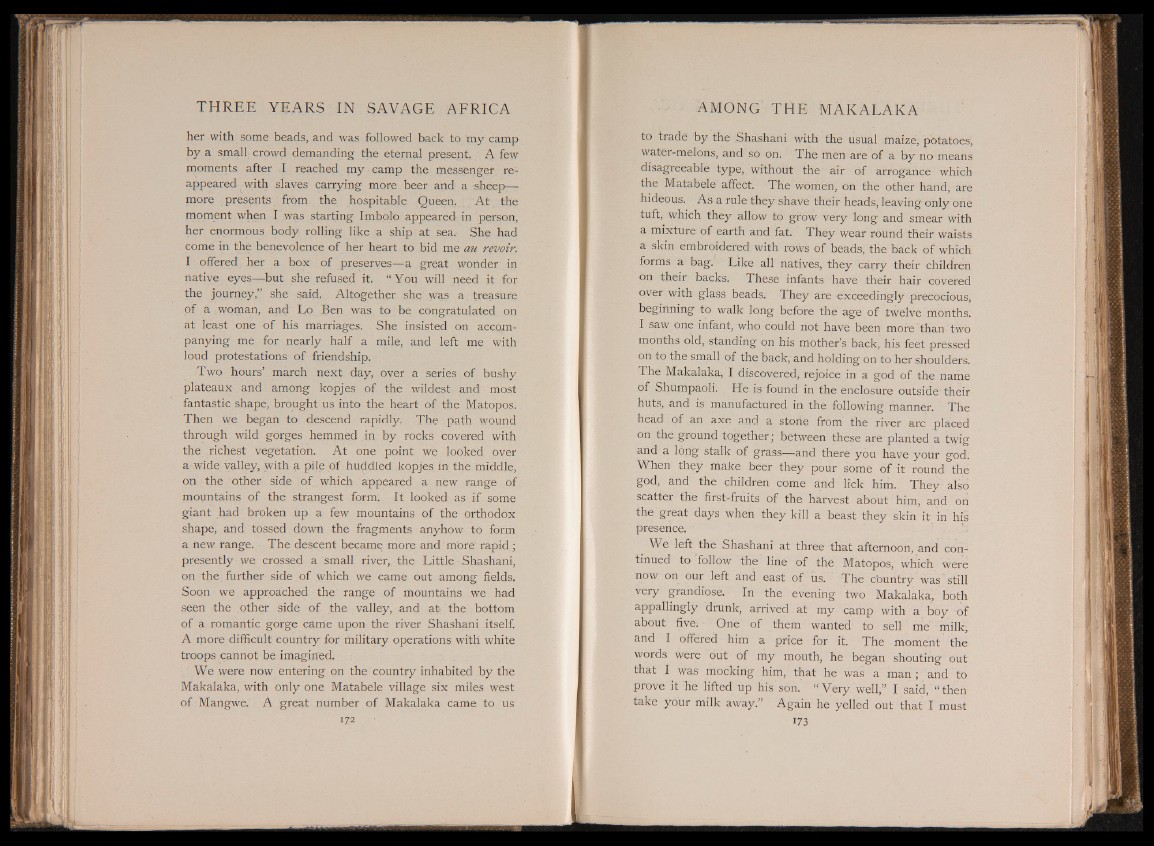
her with some beads, and was followed back to my camp
by a small crowd demanding the eternal present. A few
moments after I reached my camp the messenger reappeared
with slaves carrying more beer and a sheep-
more presents from the hospitable Queen. At , the
moment when I was starting Imbolo appeared in person,
her enormous body rolling like a ship at sea. She had
come in the benevolence of her heart to bid me au revoir.
I offered her a box of preserves—a great wonder in
native eyes—but she refused it. “ You will need it for
the journey,” she said. Altogether she was a treasure
of a woman, and Lo Ben was to be congratulated on
at least one of his marriages. She insisted on accompanying
me for nearly half a mile, and left me with
loud protestations of friendship.
Two hours’ march next day, over a series of bushy
plateaux and among kopjes of the wildest and most
fantastic shape, brought us into the heart of the Matopos.
Then we began to descend rapidly. The path wound
through wild gorges hemmed in by rocks covered with
the richest vegetation. At one point we looked over
a wide valley, with a pile of huddled kopjes in the middle,
on the other side of which appeared a new range of
mountains of the strangest form. It looked as if some
giant had broken up a few mountains of the orthodox
shape, and tossed down the fragments anyhow to form
a new range. The descent became more and more rapid ;
presently we crossed a small river,, the Little Shashani,
on the further side of which we came out among fields.
Soon we approached the range of mountains we had
seen the other side of the valley, and at- the bottom
of a romantic gorge came upon the river Shashani itself.
A more difficult country for military operations with white
troops cannot be imagined.
We were now entering on the country inhabited by the
Makalaka, with only one Matabele village six miles west
of Mangwe.' A great number of Makalaka came to us
172
to trade by the Shashani with the usual maize, potatoes,
water-melons, and so On. The men are of a by no means
disagreeable type, without the air of arrogance which
the Matabele affect. The women, on the other hand, are
hideous. As a rule they shave their heads, leaving only one
tuft, which they allow to grow very long and smear with
a mixture of earth and fat. They wear round their waists
a skin embroidered, with rows of beads, the back of which
forms a bag. Like all natives, they carry their children
on their backs. These infants have their hair covered
over with glass beads. They are exceedingly precocious,
beginning to walk long before the age of twelve months.
I saw one infant, who could not have been more than two
months old, standing on his mother’s back, his feet pressed
oh to the small of the back, and holding on to her shoulders.
The Makalaka, I discovered, rejoice in a god of the name
of Shumpaoli. He is found in the enclosure outside their
huts, and is manufactured in the following manner. The
head of an axe and a stone from the river are placed
on the ground together; between these are planted a twig
and a long stalk of grass—and there you have your god.
When they make beer they pour some of it round the
god, and the children come and lick him. They also
scatter the first-fruits of the harvest about him, and on
the great days when they kill a beast they skin it in his
presence.
We left the Shashani at three that afternoon, and continued
to follow the line of the Matopos, which were
now on our left and east of us. The c'ountry was still
very grandiose. In the evening two Makalaka, both
appallingly drunk, arrived at my camp with a boy of
about five: One of them wanted to sell me milk,
and I offered him a price for it. The moment the
words were out of my mouth, he began shouting out
that I was mocking him, that he was a man; and to
prove it he lifted up his son. “ Very well,” I said,'“ then
take your milk away.” Again he yelled out that I must
173